Will Dean: 'The Mark Zuckerberg of extreme sports'
- Published
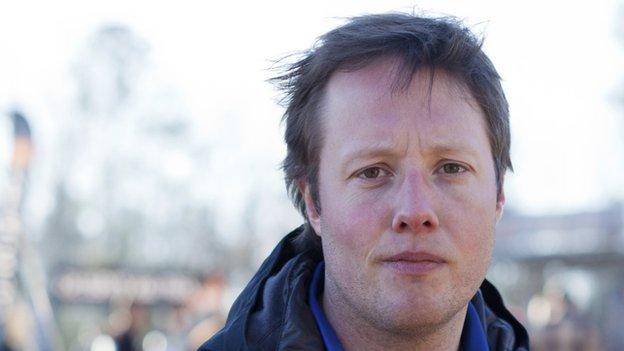
Will Dean is often described as "the Mark Zuckerberg of extreme sports". It is not always meant as a compliment.
Mr Dean, 33, is the founder and boss of Tough Mudder, the world's biggest organiser of extreme obstacle course races.
Last year, half a million people around the world paid up to $200 (£120) to take part in one of the company's events.
In exchange for their money, participants try to run, jump, swim, crawl and haul themselves around a 10 to 12 mile (16 to 19km) military-style obstacle course.
In their way are up to 25 obstacles which - among relentless inhumanities - force people to submerge themselves in icy water, slither through mud, dodge live electric cables and barbed wire, and somehow push their weary bodies over numerous walls.
While this sounds like hell to most of us, New-York-based Tough Mudder is tremendously popular - its events can sell out months in advance.
And while the company was only established in 2010, it now enjoys annual revenues of more than $100m (£60m).
So far so wonderful, except that the boss of a rival company accuses Mr Dean of stealing his idea.
And the owner of another competitor to Tough Mudder said last year: "There's not a person on this planet I despise more than Will Dean."
It seems that the often brutal nature of extreme sports is not just reserved for events days.
'Form of flattery'
Like Facebook founder Mr Zuckerberg, Mr Dean went to Harvard University in Boston.
Mr Dean, who is British, did Harvard's celebrated Master of Business Administration (MBA) course from 2007 to 2009.
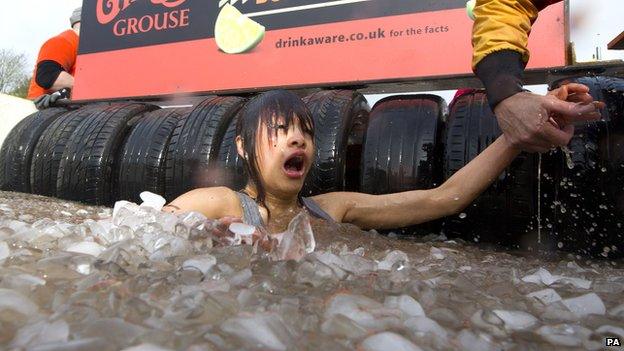
The Tough Mudder events are popular with both male and female entrants
And while Mr Zuckerberg was accused of stealing the idea for Facebook from two fellow students at the college, Mr Dean has been accused of stealing the idea for Tough Mudder from an existing rival.
However, it is important to stress at this point that both Mr Zuckerberg and Mr Dean have always denied any infringement of intellectual property rights.
In Mr Dean's case, as part of his MBA he studied an extreme obstacle course event company based in Shropshire, England, called Tough Guy.
Billy Wilson, the owner of Tough Guy, and a former British soldier, allowed Mr Dean to closely analyse his business.
When Mr Dean then went on to establish Tough Mudder a year after leaving Harvard, Mr Wilson sued.
The matter was subsequently settled out of court, with a reported $750,000 (£446,000) being paid to Mr Wilson.
Speaking at Tough Mudder's UK office in central London, a very likeable Mr Dean says he cannot talk about the dispute with Mr Wilson and Tough Guy because of legal restrictions.
Yet he adds that Tough Mudder itself does not have any intellectual property protection, and that any rival can try to replicate its successes.
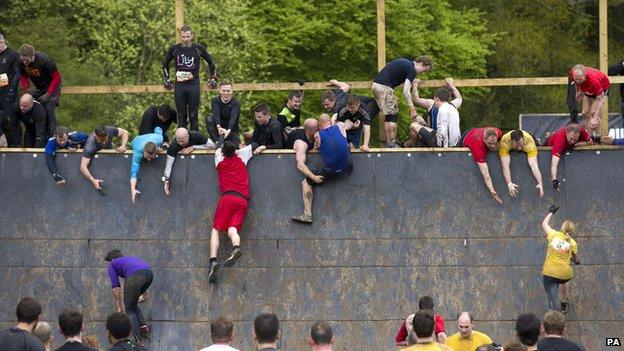
Tough Mudder's courses are designed to make team work an essential part of success
He describes the abuse he has faced as "a form of flattery", and an indication of Tough Mudder's domination of the marketplace.
"I think when you are number one it is smart strategy for other organisations to try and position themselves as the underdog brand," he says.
"If I was number two I would probably do the same."
Team event
One fact which is indisputable is the sheer speed of Tough Mudder's growth, which Mr Dean describes as "nothing short of remarkable".
This is especially true when you consider that the business has not needed any external investors.
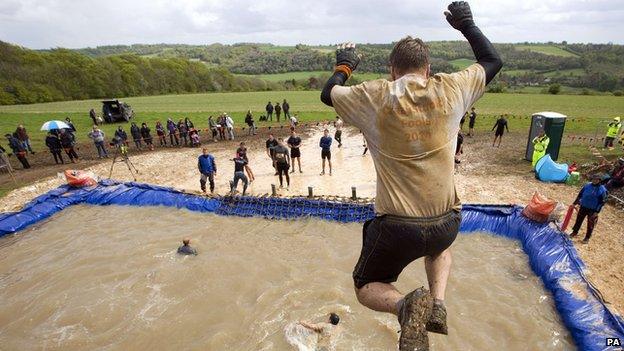
Tough Mudder has not required any outside investors to make a leap of faith
Mr Dean adds: "I said that by 2012 I wanted us to have 7,000 participants, and we had half a million."
He puts the popularity of Tough Mudder events down to a number of factors, but says the most important is that they have "got the blend right between it being fun and tough, and [that] it is a team challenge".
Explaining this, he says that when he first set up Tough Mudder he noticed that all the existing events in the field were race-focused, very serious, and put individuals up against individuals.
By contrast, he says Tough Mudder is an event in which people participate in teams, and while tough, is designed to also be enjoyable, and achievable for most reasonably fit people. And technically Tough Mudder events are not races, as people aren't timed, and everyone gets a winners medal.
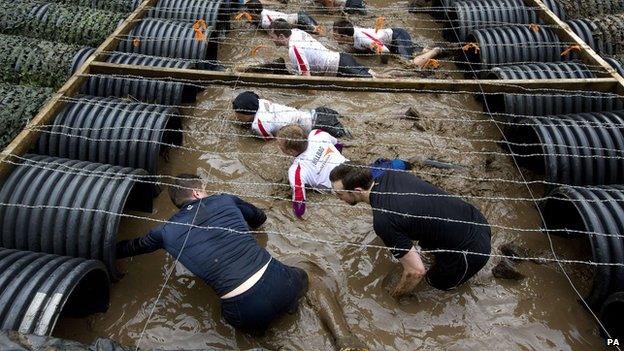
Tough Mudder's growth has been smoother than many competitors find its courses
Tough Mudder has undoubtedly also benefited from a forensic focus on marketing, such as successfully creating buzz campaigns on social media.
"This is basic business," says Mr Dean, "You can build a great product, but you have to invest in selling it."
As the number of people signing up to Tough Mudder quickly dwarfed its rivals, Mr Dean says this has enabled the company to "invest significantly more in its obstacles [that our competitors]", which has further fuelled its popularity.
Global expansion
Born and bred in Nottinghamshire, in England's East Midlands, prior to enrolling at Harvard, Mr Dean had worked for the UK government's Foreign Office for five years, where he did counter terrorism work.
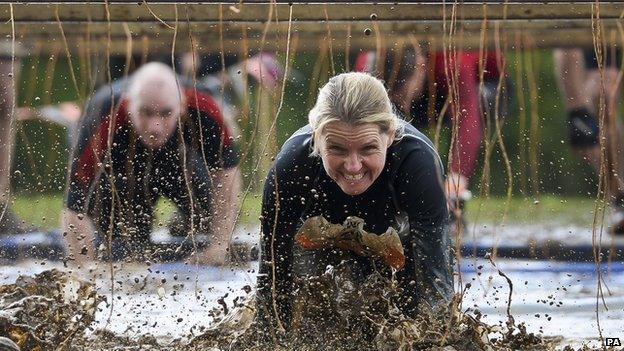
Tough Mudder's events are invariably sell outs
Although he said it was an exciting job, he left to do the MBA as he had always wanted to run his own business.
On completion of the course at Harvard Mr Dean moved to New York to follow his American girlfriend, and now wife, Katie.
Tough Mudder was then born in New York's fashionable Brooklyn in 2010.
Mr Dean, who has a degree in economics and politics from Bristol University, says he is now focused on Tough Mudder's continued international growth. The company currently has 170 staff across its New York, London, Berlin and Melbourne offices.
"People talk about this industry, but if you look at the stats - and I don't mean to brag - we are this industry," he says.
"We have between 80% and 85% of the market in the UK, and in the US more like 70% to 75%."
"Most people are evangelical about us, and a few people are resentful of our success, that is what it boils down to [when you become the market leader]."